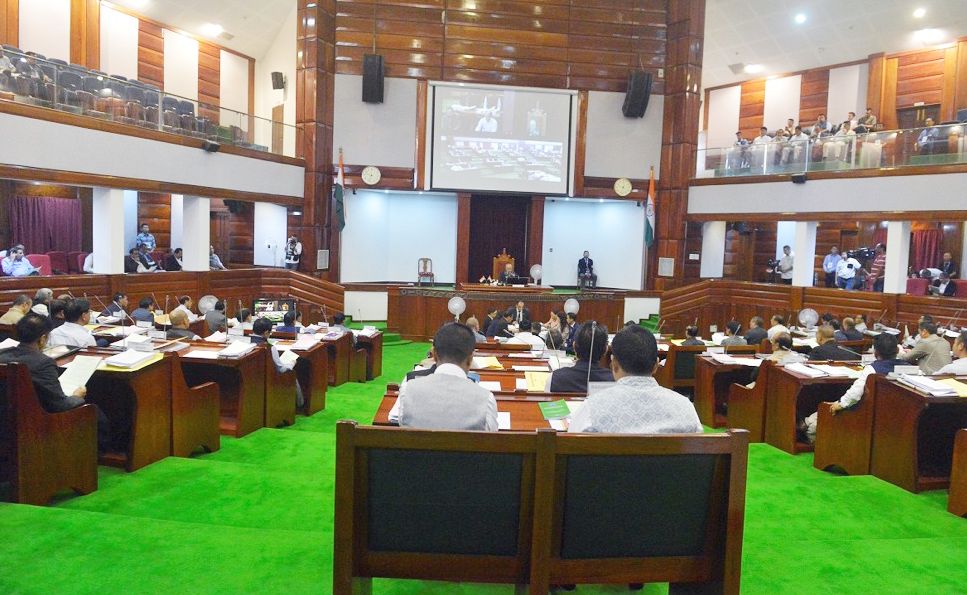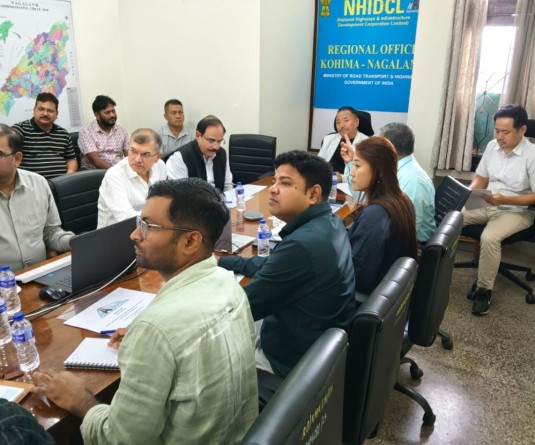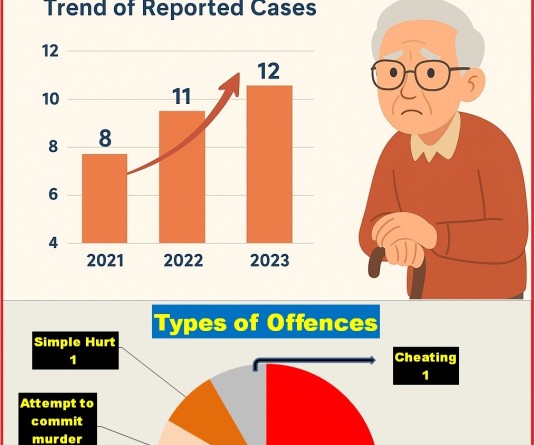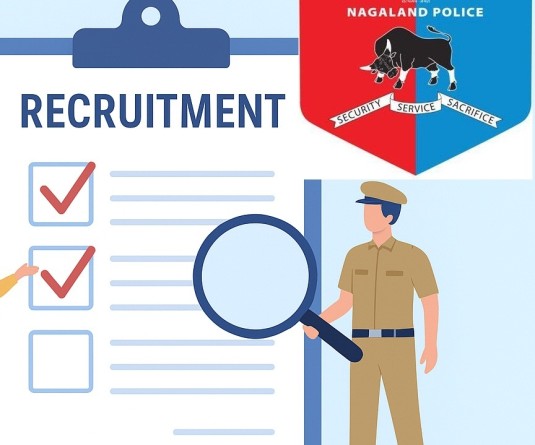NLA session discusses RIIN, ILP

The fourth session of the thirteenth Nagaland Legislative Assembly in session on August 6. (DIPR Photo)
Our Correspondent
Kohima | August 6
The fourth session of the 13th Nagaland Legislative Assembly (NLA) today discussed matters pertaining to the Registration of Indigenous Inhabitants of Nagaland (RIIN) and Inner Line Permit (ILP).
Discussion on these two issues is set to continue on August 8.
Minister for Agriculture and Co-operation, G. Kaito Aye stated that it is time to ensure that future generations are protected.
“I think it will not be wrong on the part of Nagas to have the identity number of indigenous people of Nagas of Nagaland,” the Minister said. He urged the elected representatives to come together and address the people's interest first.
“What is wrong when we identify our indigenous people of the state?” he questioned.
School Education Advisor, KT Sukhalu meanwhile conceded that the RIIN should be implemented in a proper manner and not haphazardly. He added that implementation of RIIN was essential to protect the future generations.
“Let us put our head together to find solutions one step at à time by joining hands, no ruling, no opposition but for the common cause of the Nagas in whole,” he appealed.
Earlier, opposition NPF MLA, Dr Chotisuh Sazo questioned why the government had issued notification for implementation of RIIN before it was taken for public discussion or discussion in the Assembly.
He noted that if a commission is constituted to look into the RIIN, there should not be discussion as it may influence the commission.
“However, we know that government is determined to go ahead with implementation of RIIN,” he said.
Sazo expressed apprehension that many Nagas will be left out in RIIN in their own villages if December 1, 1963 is to be taken strictly as a cut off deadline. “Because the then undivided NNC/FGN cadres refused themselves and also stopped many villagers to be enrolled in those two censuses,” he said.
If RIIN is implemented, Sazo suggested that Village Councils and GBs be empowered to undertake the registration.
Focusing on Dimapur, Sazo stated that if all Nagas register themselves in their respective ancestral villages, the original indigenous inhabitants in Dimapur will be mostly Kacharis, Garos and non- Nagas. “This may have effect on Nagas in employment in Dimapur district in future,” he cautioned.
Further, the MLA pointed out that many new villages have been established and recognized recently and many people from outside Nagaland have also settled in those villages, not forgetting that there are villages of Nagas from outside Nagaland and Non-Nagas in Nagaland. “If those villagers are taken on equal status, RIIN will legitimize many non- Nagas and Nagas from outside Nagaland to get indigenous inhabitant certificate for employment in future,” he added.
“There will be a lot of complications unless proper modalities are framed. The student bodies and tribal hohos, GBs, Chairmans should be involved while enrolling the RIIN especially in the towns so as to prevent any bogus entry,” he said.
He further stressed that the RIIN should not be a stumbling block to the integration of Nagas.
ILP more urgent: Opposition
Stressing on the need to implement the ILP first, Sazo pointed out that several trades have been dominated by illegal immigrants, while Naga’s engaged in those trades are struggling.
“Therefore unless we put a check into migration of illegal migrants and strictly implement the Inner Line Permit, it is going to be too late and we will be like outsiders in our land like Tripura,” he said.
“I do not know why the government is trying to divert it from the main issue to the RIIN which will take time for registration,” he questioned
NPF MLA, Y Vikheho Swu meanwhile said that ILP and RIIN “are two different issues; one is to regulate illegal entry into Nagaland and the other is to register the indigenous inhabitants of Nagaland.”
He observed that the fundamental principle to have an exclusive identification of indigenous Naga people should be done taking into consideration many aspects as it would disorient the basic fabric of Naga identity which transcends borders.
“If this is not handled carefully it has a potential to incite consequential misunderstanding leading to severing of ties and healthy relationships amongst Nagas living beyond the borders of Nagaland,” Swu said. As an example, he reminded that the boundary dispute between Nagaland and Assam still remains unresolved “even as we are prepared to list out indigenous inhabitant of Nagaland.”
Swu also said that the process and practice to ascertain an Indigenous person in Nagaland has been long diluted and infiltrated.
“In Nagaland, for too long, adoption of non-Nagas and giving him/her family title after adoption has been in practice, perhaps on humanitarian ground, without realizing the future consequence…How will the Government of Nagaland handle this mess?” Swu questioned.
While acknowledging that the RIIN can provide a platform for Nagas to engage in meaningful dialogue, Swu congratulated all groups and individuals who have initiated or joined the debate.
“This is not the time to point fingers at one another or misunderstand each other’s opinion. The government must allow all opinion to come out freely so that a consensus opinion may come about that will truly determine who Nagas want to be,” he added.






